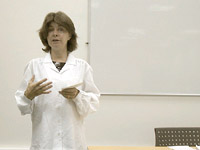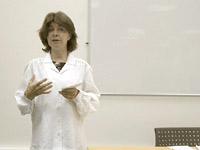
Sana’ani Dialect ‘Lilmah hee haaliah?’ (Why is it beautiful?) [Archives:2001/12/Last Page]
March 19 2001

What Mrs. Watson considers as Sana’ani dialect is the one spoken by the native inhabitants of “Old Sana’a”, those who have lived there as long as they can remember, limiting the number to a 100,000 approximately. These people have been surrounded by the city walls for centuries, and there was a time when the gates of the walls were closed at sunset while the geography of Sana’a made it difficult for other cultures and dialects to influence the Sana’ani dialect. Hence it was preserved for centuries, until a few decades ago when the dialect began to receive outside influence. However, the old people of Sana’a still remember what it was like before the walls went down and they still speak the way they used to speak 40 or 50 years ago. What is special about the Sana’ani dialect was brought out through examples which made it clear that it preserved words coming form Classical Arabic such as “Alladhi, ma?, dhalik, lakin..etc”, words which are no longer used in the dialects of today. The most interesting fact which she brought to light is that the roots of many words are quadrilateral rather than trilateral, words such as “jarjar, hazhaz..etc”. Also interesting is that they have their own rhymes which don’t exist in any other dialect. Is the dialect changing? The answer is ‘yes’. There are three ways that a dialect can change: through loss, gain and change. This does not mean only vocabulary gain (which results from the influence of other dialects or the appearance of new products which have to be called something.), loss (through the changing of words with the passing of the years such as how “laish” is gradually changing to “lilmah”, or through products falling out of use), and change (through increasing or decreasing lengths of the words or the way they are used, such as how they used to say “saa’at khams” for five o’clock while now they say “al-saah khams.”) There is a Phonetic change where words are not said how they were said before, such as the way the sound “h” is gradually disappearing from words like “intahat” (as in finished) to “inta’at. and so on.
Professor Watson has written three books exclusively on Sana’ani dialect and is in the process of writing the fourth. She has also studied Egyptian dialect and is doing a comparison between the two in her research.
——
[archive-e:12-v:2001-y:2001-d:2001-03-19-p:./2001/iss12/lastpage.htm]


